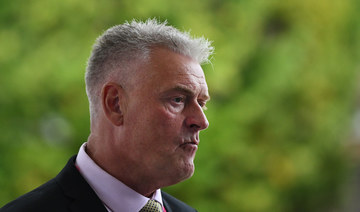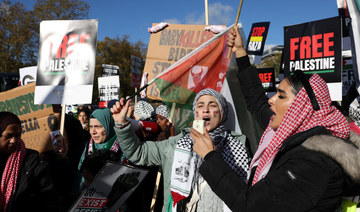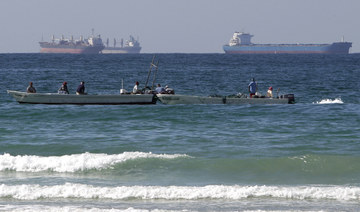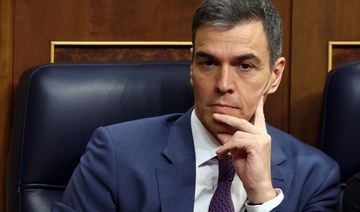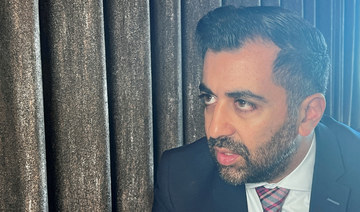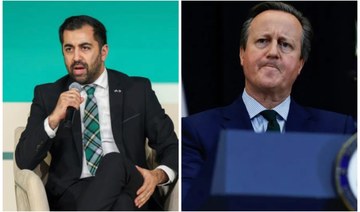LONDON: The British government said Wednesday that it is stepping up security for lawmakers after politicians reported threats and intimidation connected to the Israel-Hamas war.
The Home Office said a 31 million-pound ($40 million) fund will give every lawmaker a “dedicated named police contact” and provide money for those facing threats to pay for private security protection.
The government said some of the money will go more broadly to protecting Britain’s “democratic processes from intimidation, disruption or subversion” ahead of a general election later this year. The fund includes money for extra police patrols in areas where tensions are high.
Divisions over the conflict in Gaza have convulsed British politics, with some lawmakers saying they fear for their safety after receiving threats over their positions on the war. Reports of both antisemitic and anti-Muslim abuse in Britain have soared since Hamas’ Oct. 7 attack on Israel, which triggered Israel’s invasion of Gaza.
A debate last week in the House of Commons on whether to call for a ceasefire descended into chaos amid allegations the speaker of the house had bent parliamentary rules in response to pressure from pro-Palestinian activists.
Conservative lawmaker Mike Freer has announced he is stepping down because of abuse and death threats linked to his support for Israel. Freer said an arson attack on his office in December was the “final straw.”
He said the money announced Wednesday was only “dealing with the symptom” rather than “going to the root cause” of why people feel emboldened to attack politicians.
“Security is welcome,” Freer told Times Radio. “But frankly, unless you get to the root cause, then you’re just going to have a ring of steel around MPs. And our whole style of democracy changes.”
British lawmakers have a tradition of meeting regularly with constituents in their local communities, but security has been tightened after several attacks in the last decade. In 2016, Labour lawmaker Jo Cox was killed by a far-right extremist, and Conservative David Amess was murdered in 2021 by an attacker inspired by the Daesh group.
In 2017 a Daesh-inspired extremist killed four people with a vehicle on Westminster Bridge before stabbing a police officer to death at the gates of Parliament. Two years later, in 2019, a neo-Nazi pleaded guilty to plotting to kill a Labour lawmaker.
Anti-war activists claimed the government was trying to stifle protest and lumping peaceful demonstrators in with violent extremists.
Home Secretary James Cleverly called on pro-Palestinian demonstrators to halt the mass protests that have drawn hundreds of thousands of people to central London almost weekly to call for a ceasefire in a conflict that has killed close to 30,000 Palestinians, according to the Gaza health ministry in the Hamas-run territory.
Israel says Hamas killed 1,200 Israelis, mostly civilians, and abducted roughly 250, in the Oct. 7 attack.
The protests have been overwhelmingly peaceful, though there have dozens of arrests over signs and chants allegedly supporting Hamas, a banned organization in Britain. Jewish organizations and many lawmakers say the mass marches have created an intimidating atmosphere for Jewish Londoners — though members of the Jewish community have been among those on pro-ceasefire marches.
“I genuinely don’t know what these regular protests are seeking to achieve,” Cleverly told the Times of London. “They have made their position clear, we recognize that there are many people in the UK that hold that position. We respect that, but the UK government’s position is a disagreement with that for very practical, well thought-out reasons.”
The government says it supports an immediate “humanitarian pause” in the fighting but says a permanent ceasefire can only happen if Hamas frees all Israeli hostages and relinquishes control of Gaza.
Ben Jamal, director of the Palestine Solidarity Campaign, which has organized many protests, said Cleverly’s comments showed the government did not understand the role of protest “as an important part of the democratic process.”
“They regard it as a hindrance, something that should be suppressed,” Jamal said.
UK stepping up lawmakers’ security as tensions flare over Israel-Hamas war
https://arab.news/pgkun
UK stepping up lawmakers’ security as tensions flare over Israel-Hamas war
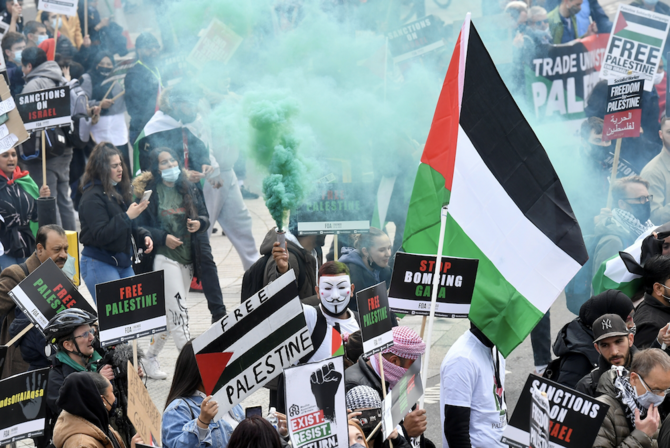
- The fund includes money for extra police patrols in areas where tensions are high
- Reports of both antisemitic and anti-Muslim abuse in Britain have soared since Hamas’ Oct. 7 attack on Israel
Ukraine’s Zelensky urges US to speed up weapons deliveries
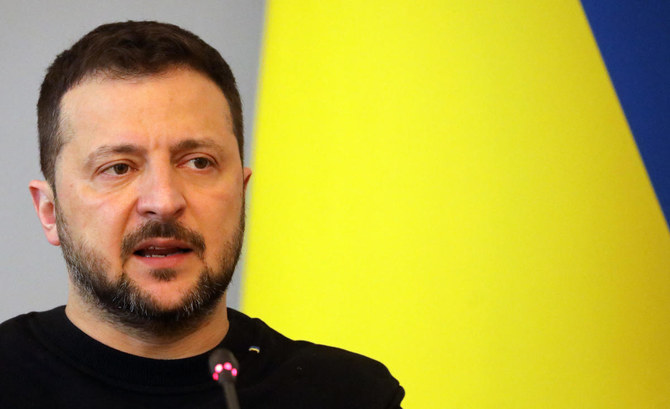
Zelensky told a joint news conference in Kyiv alongside visiting NATO chief Jens Stoltenberg that the situation on the battlefield directly depended on the speed of ammunition supplies to Ukraine.
“Timely support for our army. Today I don’t see anything positive on this point yet. There are supplies, they have slightly begun, this process needs to be sped up,” he said.
Scotland’s Humza Yousaf quits in boost to Labour before UK vote
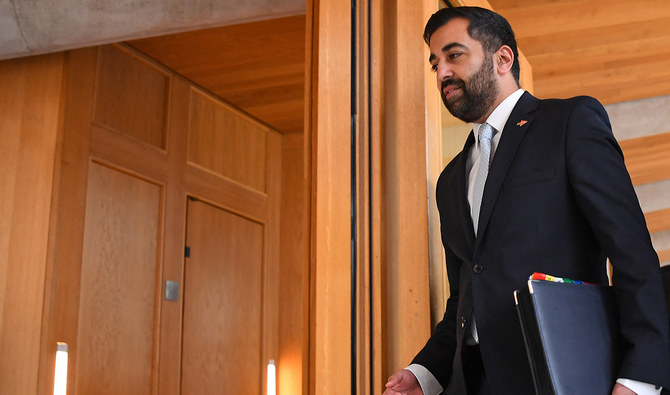
- Yousaf quit after a week of chaos triggered by his scrapping of a coalition agreement with Scotland’s Greens
- He then failed to secure enough support to survive a vote of no confidence against him expected later this week
LONDON: Scotland’s leader Humza Yousaf resigned on Monday, further opening the door to the UK opposition Labour Party regaining ground in its former Scottish heartlands during a national election expected to be held later this year.
Yousaf said he was quitting as head of the pro-independence Scottish National Party (SNP) and first minister of Scotland’s devolved government after a week of chaos triggered by his scrapping of a coalition agreement with Scotland’s Greens.
He then failed to secure enough support to survive a vote of no confidence against him expected later this week.
Resigning little over a year after he replaced Nicola Sturgeon as first minister and SNP leader, Yousaf said it was time for someone else to lead Scotland.
“I’ve concluded that repairing our relationship across the political divide can only be done with someone else at the helm,” Yousaf said, adding he would continue until a successor was chosen in an SNP leadership contest.
Yousaf abruptly ended a power-sharing agreement between his pro-independence SNP and the Green Party after a row over climate change targets. The SNP’s fortunes have faltered over a funding scandal and the resignation of Sturgeon as party leader last year. There has also been infighting over how progressive its pitch should be as it seeks to woo back voters.
Caught between defending the record of the coalition government and some nationalists’ demands to jettison gender recognition reforms and refocus on the economy, Yousaf was unable to strike a balance that would ensure his survival.
The SNP is losing popular support after 17 years of heading the Scottish government. Earlier this month, polling firm YouGov said the Labour Party had overtaken the SNP in voting intentions for a Westminster election for the first time in a decade.
Labour’s resurgence in Scotland adds to the challenge facing British Prime Minister Rishi Sunak’s Conservative Party which is lagging far behind Labour in UK-wide opinion polls.
The Scottish parliament now has 28 days to choose a new first minister before an election is forced, with former SNP leader John Swinney and Yousaf’s former leadership rival Kate Forbes seen as possible successors.
If the SNP is unable to find a new leader to command support in parliament, a Scottish election will be held. Yousaf, the first Muslim head of government in modern Western Europe, succeeded Sturgeon as first minister in March 2023. Once hugely popular, Sturgeon has been embroiled in a party funding scandal with her husband, who was charged this month with embezzling funds. Both deny wrongdoing.
Iran slams crackdown on US student protesters
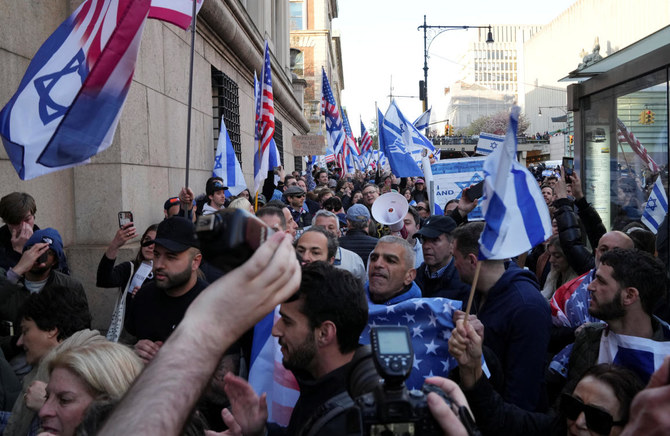
- The demonstrations began at Columbia University in New York and have since spread across the country
Tehran: Iran on Monday criticized a police crackdown in the United States against university students protesting against the rising death toll from the Israel-Hamas war in the Gaza Strip.
“The American government has practically ignored its human rights obligations and respect for the principles of democracy that they profess,” foreign ministry spokesman Nasser Kanani said.
Tehran “does not at all accept the violent police and military behavior aimed at the academic atmosphere and student demands,” he said.
American universities have been rocked by pro-Palestinian demonstrations, triggering campus clashes with police and the arrest of some 275 people over the weekend.
The demonstrations began at Columbia University in New York and have since spread across the country.
In Iran, hundreds of people demonstrated in Tehran and other cities on Sunday in solidarity with the US demonstrations.
Some carried banners proclaiming “Death to Israel” and “Gazans are truly oppressed,” state media reported.
The Gaza war broke out after the October 7 attack by Palestinian militants on Israel which killed 1,170 people, mostly civilians, according to Israeli figures.
Tehran backs Hamas, but has denied any direct involvement in the attack.
Israel’s retaliatory offensive against Hamas has since killed at least 34,488 people in Gaza, mostly women and children, according to the Hamas-run territory’s health ministry.
“What we have seen in American universities in recent days is an awakening of the world community and world public opinion toward the Palestinian issue,” Kanani said.
“It is not possible to silence the loud voices of protesters against this crime and genocide through police action and violent policies.”
Pedro Sanchez stays on as Spain’s prime minister after weighing exit
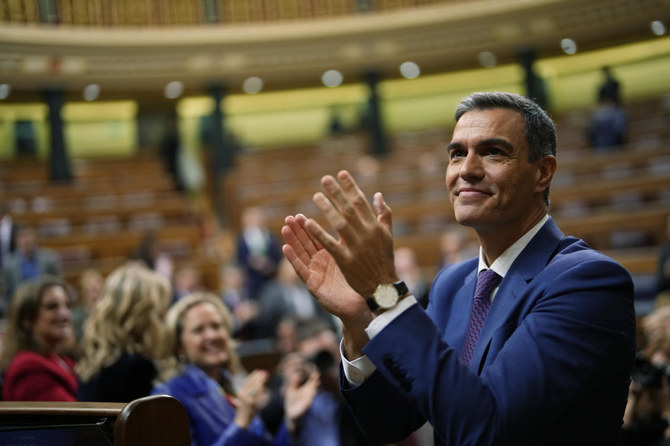
- Sanchez had surprised foes and allies when earlier said he considers quitting
- He described the court investigation of his wife Begona Gomez for influence peddling and business corruption as orchestrated by his opponents
MADRID: Spain’s Prime Minister Pedro Sanchez said on Monday he had decided to continue in office, days after abruptly announcing he was considering his future following the launch of a corruption investigation against his wife.
The center-left prime minister, 52, had surprised foes and allies alike when he said on Wednesday he was taking time from public duty to consider quitting. He described the court investigation of his wife Begona Gomez for influence peddling and business corruption as orchestrated by his opponents.
Sanchez met King Felipe VI on Monday — a step that would have been necessary should he have decided to resign — but announced in a televised address that he had informed the monarch of his decision to stay on. He had been encouraged to stay by widespread expressions of support over the weekend, Sanchez said.
“I have decided to go on, if possible even stronger as prime minister. This is not business as usual, things are going to be different,” he said in a national broadcast.
His announcement that he might quit had caused further turmoil in Spanish politics, where a fractious parliament has struggled to form coalition governments after close elections. Should a new election have been required, it would have been the fourth in five years.
The opposition will try to exploit the sign of indecision from Sanchez, but the impact may be limited because Spain’s political landscape is already so polarized, said Ignacio Jurado, political science professor at Madrid’s Carlos III University.
“His credibility is already hotly contested and voters have already given it to him or taken it away,” he said. “As a leader he has shown a weakness and it’s something that the opposition will exploit a lot.”
Scottish First Minister Humza Yousaf resigns
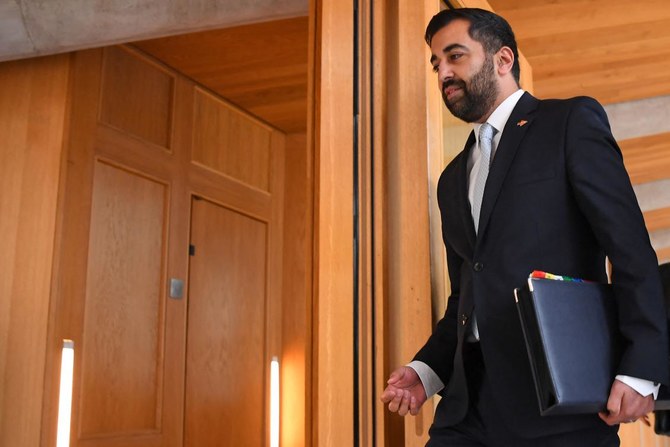
- Humza Yousaf said he would continue as first minister until a successor has been elected.
LONDON: Scotland’s First Minister Humza Yousaf resigned as leader of the Scottish National Party (SNP) on Monday and said he had ordered a contest be held to select a replacement.
“I’ve concluded that repairing our relationship across the political divide can only be done with someone else at the helm,” Yousaf said at a press conference in Edinburgh.
“I have therefore informed the SNP’s national secretary of my intention to stand down as party leader and ask that she commences a leadership contest for my replacement as soon as possible.”
He said he would continue as first minister until a successor has been elected.
Last week, Yousaf abruptly ended a power-sharing agreement between his Scottish National Party (SNP) and the Green Party, in the hopes that he could lead a minority government — but opposition parties have tabled a vote of no confidence.
The pro-independence SNP’s fortunes have faltered amid a funding scandal and the resignation of a party leader last year, while there has been infighting over how progressive its pitch should be as it seeks to woo back voters.
Just days ago, Yousaf said he was “quite confident” that he could win the no confidence vote called by political opponents, but by Monday, his offer of talks with other parties to try to shore up his minority government seemed to be faltering.
The leadership crisis and a second no-confidence vote against the Scottish government deepens problems faced by Yousaf’s Scottish National Party, which is losing popular support after 17 years of heading the Scottish Government.
Earlier this month, polling firm YouGov said the Labour Party had overtaken the SNP in voting intentions for a Westminster election, for the first time in a decade.
The leader of the Scottish Greens, Patrick Harvie, told BBC radio there was nothing Yousaf could say to persuade his party to support the first minister in the parliamentary confidence vote, leaving Yousaf with few options.
The vote is due to take place later this week.
A victory for Labour in Scotland in Britain’s next national election — expected later this year — would significantly bolster the party’s chances of taking power from Prime Minister Rishi Sunak’s Conservative Party.
If Yousaf loses, parliament would have 28 days to choose a new first minister before an election is forced.
Former SNP leader John Swinney has been approached by senior party figures to become an interim first minister in the event of Yousaf being forced from office, the Times newspaper said, adding that Swinney was reluctant to step up because of personal circumstances.
Yousaf, who previously held health and justice ministerial briefs in the Scottish Government, succeeded former SNP leader Nicola Sturgeon as first minister in March 2023.
She resigned last year and has since been embroiled in a party funding scandal with her husband, who was charged this month with embezzling funds. Both deny wrongdoing.



